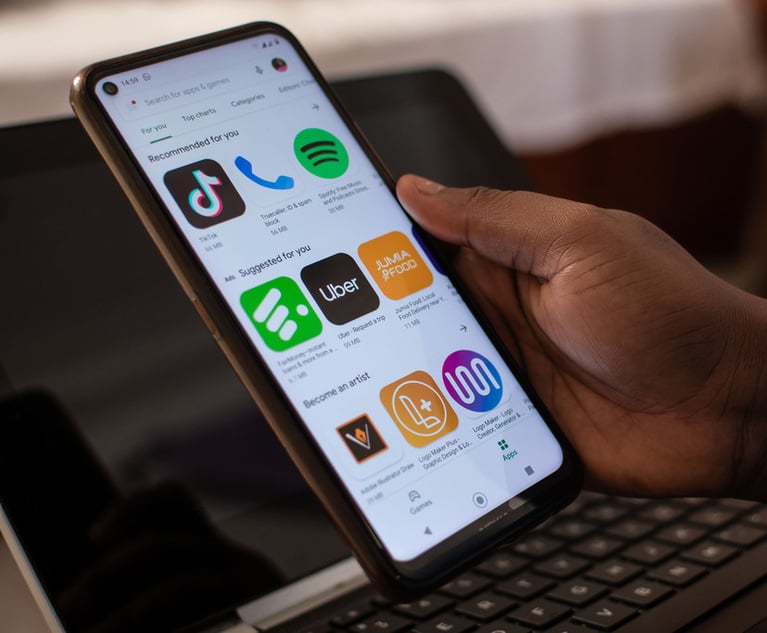Apple's First-Ever CFPB Lobbying Focuses on Mobile Payments
Apple's latest U.S. lobbying disclosure showed the company's $2.14 million in the first quarter was the second-highest ever spent.
April 23, 2018 at 04:29 PM
5 minute read
 An Apple store. Credit: Mike Scarcella
An Apple store. Credit: Mike Scarcella
Apple Inc. lobbied the Consumer Financial Protection Bureau for the first time earlier this year, advocating on mobile payments at a time when many companies are striving to convince the agency's new Republican leadership to grant regulatory relief.
The iPhone maker directed its lobbying “on issues related to mobile payments” not just at the CFPB but also at Congress and the U.S. Treasury Department, according to a disclosure of its advocacy work in the first three months of 2018.
Apple reported in the disclosure, submitted April 20, that the work was spearheaded by in-house lobbyist Jeff Dobrozsi, a former chief of staff to Republican U.S. Rep. Charles Boustany of Louisiana, now a Washington lobbyist at Capitol Counsel. Dobrozsi joined Apple's Washington office in 2014.
Dobrozsi and an Apple spokeswoman did not immediately respond to requests for comment Monday.
According to the disclosure form, Apple spent $2.14 million in the first three months of the year lobbying not only on mobile payments but a host of other issues, including tax reform and the Federal Communications Commission's recent repeal of the net neutrality policies set under the Obama administration. The amount was the second-highest the company had ever spent in any quarter, according to a review of past disclosures.
Apple had lobbied on mobile payments in previous quarters, although its efforts were restricted to the House and Senate, according to a review of past disclosures.
The company's foray into directly lobbying the CFPB came during the same quarter in which the agency relaxed the provisions of its prepaid card rule, a 2016 regulation covering mobile wallets that required companies to clearly disclose fees and cooperate with consumers who discover unauthorized charges or errors in their accounts.
In January, two months after the Trump administration installed White House budget director Mick Mulvaney as the CFPB's interim director, the agency unveiled changes to the rule intended to make it easier for consumers to link their credit cards to mobile wallets such as Apple Pay and Google Wallet. In a news release announcing the move, the CFPB said the changes “reduce potentially unnecessary complications and expense to consumers who link credit cards to digital wallets.”
The CFPB also delayed the rule's effective date by a year, to April 2019, citing industry concerns about being able to comply in time.
According to his public calendars for the early months of 2018, along with sources familiar with his time leading the CFPB, Mulvaney did not begin meeting with trade groups and other industry players until February.
Apple's lobbying could relate to Mulvaney's call in March for comments on the CFPB's regulations.
“Apple is obviously a huge player in this space and has been for a while. I think they had a pretty good idea of where they stood with the prior administration, which was open to mobile payments technology and saw it as a way to give access to underbanked people. My guess is Apple wanted to see where they stood with the new administration,” said Davis Wright Tremaine partner Jonathan Engel, a former CFPB enforcement attorney.
Engel said many of the changes were set in motion under former CFPB Director Richard Cordray. In 2015, CFPB released a report noting that mobile financial services such as digital wallets had the potential to integrate underserved consumers into the mainstream marketplace.
“The substantive changes were going to happen under Cordray. It's not as clear he would have extended the compliance deadline by a year. That was certainly a big win, buying them another year for compliance,” he said.
With its recent lobbying of the CFPB, Apple joins a cadre of industry groups and financial companies that have long engaged the agency on the prepaid card rule and its implications for digital wallets.
The Electronic Transactions Association, a trade group representing Apple and top credit card companies, has lobbied the CFPB since 2015 on mobile payments issues—specifically the prepaid card rule.
The ETA was joined that year by one of its most prominent members, American Express Co., whose other lobbying interests included the agency's consumer complaints database and the study that laid the foundation for a rule banning arbitration clauses in financial contracts that prohibited consumers from coming together to file class action lawsuits.
The CFPB finalized the rule in July, only to see it vacated under the Congressional Review Act—a 1996 law that Republicans wielded with devastating effect last year, undoing more than a dozen regulations issued at the end of the Obama administration.
PayPal, another member of the Electronic Transactions Association, has lobbied the CFPB on “mobile payment innovation” dating back to late 2015, according to a review of past disclosures.
Read more:
Our weekly briefing Compliance Hot Spots provides the latest news and trends in compliance and enforcement—what regulators are up to and how firms and in-house counsel are crafting new strategies. Learn more and sign up here.
This content has been archived. It is available through our partners, LexisNexis® and Bloomberg Law.
To view this content, please continue to their sites.
Not a Lexis Subscriber?
Subscribe Now
Not a Bloomberg Law Subscriber?
Subscribe Now
NOT FOR REPRINT
© 2024 ALM Global, LLC, All Rights Reserved. Request academic re-use from www.copyright.com. All other uses, submit a request to [email protected]. For more information visit Asset & Logo Licensing.
You Might Like
View All

'We're Going to Tear the Barriers Down': Judge Prepares to Open App Market Floodgates on Google

Track Star Alleges Gatorade's 'Recovery Gummies' Ruined Shot at Appearing in Summer Olympics
3 minute read
Johnson & Johnson, Citing 'Eye-Opening' Emails, Moves to Subpoena Beasley Allen
4 minute readTrending Stories
Who Got The Work
Michael G. Bongiorno, Andrew Scott Dulberg and Elizabeth E. Driscoll from Wilmer Cutler Pickering Hale and Dorr have stepped in to represent Symbotic Inc., an A.I.-enabled technology platform that focuses on increasing supply chain efficiency, and other defendants in a pending shareholder derivative lawsuit. The case, filed Oct. 2 in Massachusetts District Court by the Brown Law Firm on behalf of Stephen Austen, accuses certain officers and directors of misleading investors in regard to Symbotic's potential for margin growth by failing to disclose that the company was not equipped to timely deploy its systems or manage expenses through project delays. The case, assigned to U.S. District Judge Nathaniel M. Gorton, is 1:24-cv-12522, Austen v. Cohen et al.
Who Got The Work
Edmund Polubinski and Marie Killmond of Davis Polk & Wardwell have entered appearances for data platform software development company MongoDB and other defendants in a pending shareholder derivative lawsuit. The action, filed Oct. 7 in New York Southern District Court by the Brown Law Firm, accuses the company's directors and/or officers of falsely expressing confidence in the company’s restructuring of its sales incentive plan and downplaying the severity of decreases in its upfront commitments. The case is 1:24-cv-07594, Roy v. Ittycheria et al.
Who Got The Work
Amy O. Bruchs and Kurt F. Ellison of Michael Best & Friedrich have entered appearances for Epic Systems Corp. in a pending employment discrimination lawsuit. The suit was filed Sept. 7 in Wisconsin Western District Court by Levine Eisberner LLC and Siri & Glimstad on behalf of a project manager who claims that he was wrongfully terminated after applying for a religious exemption to the defendant's COVID-19 vaccine mandate. The case, assigned to U.S. Magistrate Judge Anita Marie Boor, is 3:24-cv-00630, Secker, Nathan v. Epic Systems Corporation.
Who Got The Work
David X. Sullivan, Thomas J. Finn and Gregory A. Hall from McCarter & English have entered appearances for Sunrun Installation Services in a pending civil rights lawsuit. The complaint was filed Sept. 4 in Connecticut District Court by attorney Robert M. Berke on behalf of former employee George Edward Steins, who was arrested and charged with employing an unregistered home improvement salesperson. The complaint alleges that had Sunrun informed the Connecticut Department of Consumer Protection that the plaintiff's employment had ended in 2017 and that he no longer held Sunrun's home improvement contractor license, he would not have been hit with charges, which were dismissed in May 2024. The case, assigned to U.S. District Judge Jeffrey A. Meyer, is 3:24-cv-01423, Steins v. Sunrun, Inc. et al.
Who Got The Work
Greenberg Traurig shareholder Joshua L. Raskin has entered an appearance for boohoo.com UK Ltd. in a pending patent infringement lawsuit. The suit, filed Sept. 3 in Texas Eastern District Court by Rozier Hardt McDonough on behalf of Alto Dynamics, asserts five patents related to an online shopping platform. The case, assigned to U.S. District Judge Rodney Gilstrap, is 2:24-cv-00719, Alto Dynamics, LLC v. boohoo.com UK Limited.
Featured Firms
Law Offices of Gary Martin Hays & Associates, P.C.
(470) 294-1674
Law Offices of Mark E. Salomone
(857) 444-6468
Smith & Hassler
(713) 739-1250










